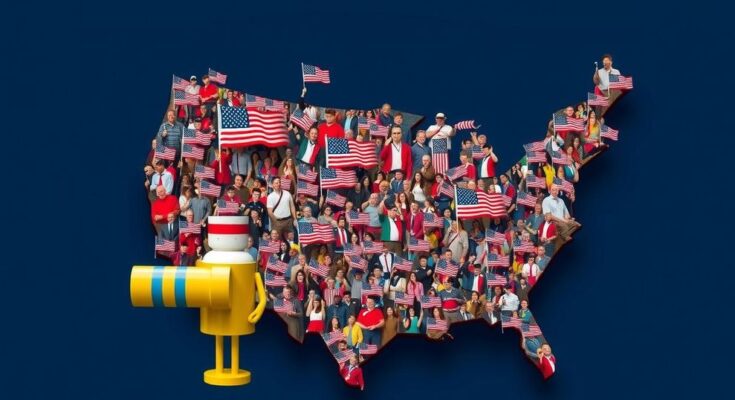As the U.S. presidential election nears its end, voters increasingly show support through campaign merchandise, much of which is produced in China. The rise of e-commerce has led to a significant influx of cheap election goods into the American market, putting pressure on U.S. manufacturers to compete. The discrepancy in pricing raises concerns over trade practices and domestic economic implications, leading to irony where supporters of candidates advocating for American jobs often purchase foreign-made products. This situation highlights the challenges of maintaining a robust manufacturing sector in the face of globalization.
As the United States presidential election approaches its conclusion, there is a notable rise in voters demonstrating their support for candidates through various election-themed merchandise. However, a significant number of these items, such as the well-known “Make America Great Again” hats and novelty shirts, are being produced in China. E-commerce platforms have facilitated the influx of these inexpensive goods into the American market, resulting in increased competition that is challenging domestic manufacturers. Ben Waxman, founder of American Roots, an apparel company that sources all raw materials and production in the U.S., expressed concerns over the overwhelming amount of cheap Chinese merchandise that is adversely affecting American businesses’ ability to thrive. He highlighted the disparity in pricing, citing his own campaign T-shirts priced at approximately $15, contrasted with prices as low as $3 for similar products available on platforms like Temu. Waxman noted, “It’s more expensive when you pay higher wages, living wages, and abide by environmental standards,” implying that the lower costs of Chinese merchandise often arise from their less stringent labor and environmental regulations. According to preliminary observations, there appears to be a substantial number of these Chinese-made election products available for sale online, overshadowing American-made alternatives. On Temu, election-themed merchandise proliferates, with items like “Make America Great Again” hats selling for under $4, compared to the official campaign store’s price of $40. Despite claims from the Trump and Harris campaigns that they exclusively sell domestically-produced products, the availability of Chinese alternatives at significantly lower prices complicates the landscape for potential voters focused on supporting local manufacturing. The prevalence of these imports illustrates the challenges faced by the U.S. to diminish its reliance on foreign products, especially in light of trade loopholes such as the de minimis rule, which allows goods under $800 to enter the U.S. duty-free. Kim Glas, president of the National Council of Textile Organizations, reported that exploitations of this policy have resulted in substantial manufacturing losses over the past year. Despite inquiries directed towards major e-commerce platforms regarding their role in the importation of election merchandise, responses have remained elusive. Nonetheless, Temu communicated its operational strategies without directly addressing the electoral merchandise market. As electoral candidates engage in discussions regarding trade and economic revitalization, the irony persists that their supporters often purchase foreign-made merchandise aligned with their political affiliations. Mitch Cahn, president of Unionwear, argued that individuals supporting candidates on the basis of enhancing domestic manufacturing should reconsider the implications of purchasing products made overseas. Cahn remarked, “If someone is supporting a candidate because of that candidate’s economic policy…and then they’re supporting a candidate by buying a product that’s made in a country that stands for the opposite of that, they’re actually doing themselves and the candidate and the economy a disservice.” The manufacturing dynamics highlighted in this election cycle underscore a broader conversation surrounding consumer habits, economic policy, and political affiliation, suggesting the need for a reevaluation of strategies toward fostering a robust domestic manufacturing sector. The current economic climate presents both challenges and opportunities for American businesses to distinguish themselves in a market inundated with foreign goods.
During presidential election cycles in the United States, voter engagement often manifests through the purchase and display of campaign merchandise. With the rise of e-commerce, there has been a significant shift in the sources of these products, especially with an influx of inexpensive goods manufactured overseas. This trend raises important questions about the implications for domestic manufacturers, particularly as U.S. consumers increasingly choose lower-priced, foreign-made items. The challenges faced by American producers, in light of the competitive pricing afforded by foreign manufacturing, are further exacerbated by trade loopholes that facilitate this influx. By examining the dynamics of campaign merchandise in the current election, we can better understand the intersection of consumer behavior, political loyalty, and the economic impact of international trade practices.
In conclusion, the flooding of the U.S. market with cheap Chinese-made election merchandise poses significant challenges for American manufacturers. The stark price differences between domestically-produced and imported campaign products highlight the ongoing struggle to compete in a globalized economy. As consumers grapple with their purchasing choices, the tension between supporting domestic manufacturing and seeking affordable options becomes increasingly pronounced, illuminating the complexities of economic policies advocated by political candidates amidst the realities of international trade.
Original Source: www.voanews.com




